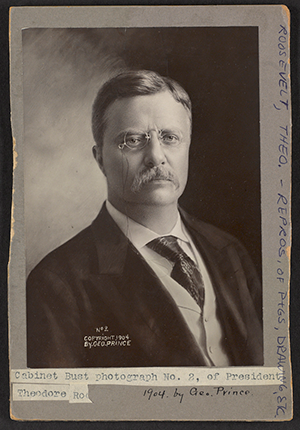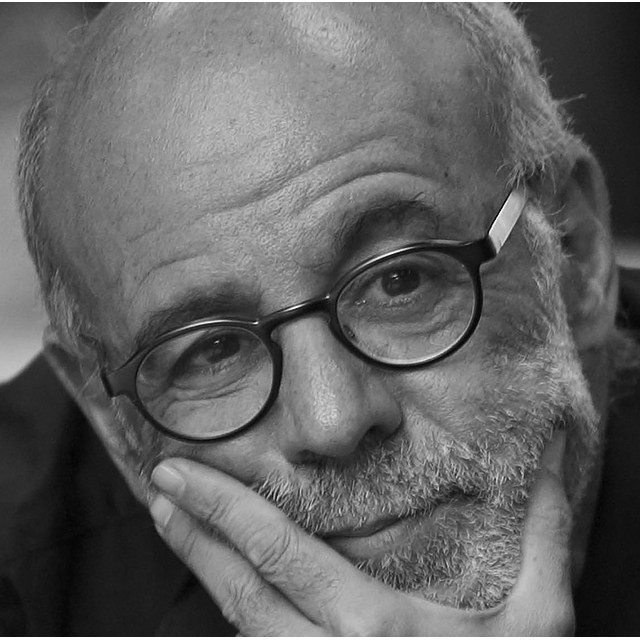Historic Document
The New Nationalism (1911)
Theodore Roosevelt | 1910

Library of Congress, Prints and Photographs Division
Summary
In a long, varied, and klieg-lit political career culminating in his unexpected ascendency to the White House while in vice presidential service, when President William McKinley was assassinated by an anarchist (he was subsequently elected on his own, and later waged a storied bid for a third term as a “Bull Moose” third-party insurgent), Theodore Roosevelt was perhaps the country’s preeminent progressive political leader, and dynamo. Although always a reformer in his native New York City, and then as the New York State Governor in Albany, Roosevelt became increasingly bold in his progressivism over time, staunchly fighting against the concentration of wealth and political power by trusts, and for the power of organized labor, regulation of the railroads and other powerful industries and corporations, including on behalf of the health and safety of workers and consumers, and the conservation of the country’s natural resources. Roosevelt vigorously promoted expanding the powers of the national government to act as a countervailing force against entrenched, and seemingly ungovernable, concentrations of private power, promising a “New Nationalism” committed to the common good of the nation as a whole, and a “Square Deal” for the American people.
Selected by

William E. Forbath
Lloyd M. Bentsen Chair in Law, and Associate Dean for Research, The University of Texas at Austin School of Law

Ken I. Kersch
Professor of Political Science, at Boston College
Document Excerpt
I stand for the square deal. But when I say that I am for the square deal, I mean not that I stand for fair play under the present rules of the game, but that I stand for having those rules changed so as to work for a more substantial equality of opportunity and of reward for equally good work ….
The American people are right in demanding that New Nationalism, without which we cannot hope to deal with new problems. The New Nationalism puts the national need before sectional or personal advantage …. It is … impatient of the impotence which springs from overdivision of governmental powers…. This New Nationalism regards the executive power as the steward of the public welfare. It demands of the judiciary that it shall be interested primarily in human welfare rather than in property, just as it demands that the representative body shall represent all the people rather than any one class or section of the people….
Unfortunately, the courts, instead of leading in the recognition of the new conditions, have lagged behind; and, as each case has presented itself, have tended by a series of negative decisions to create a sphere in which neither the nation nor state has effective control; and where the great business interests that can call to their aid the ability of the greatest corporation lawyers escape all control whatsoever….
[In] the so-called New York Bakeshop case [Lochner v. New York (1905)]… the Governor and the Legislature of the State of New York, took the action which they deemed necessary, after what inquiry and study was needed to satisfy them as to the conditions [of unhealthy conditions in the state’s bakeries] and as to the remedy [setting maximum hours for bakery workers in the state]…. But the Supreme Court of the United States possessed – and, unfortunately, exercised, the negative power of not permitting the abuse to be remedied. By a five to four vote they declared the action of the State of New York unconstitutional, because, forsooth, men must not be deprived of their “liberty” to work under unhealthy conditions….
Such decisions, arbitrarily and irresponsibly limiting the power of the people, are of course fundamentally hostile to every species of real popular government…. If my opponents disagree with me, let them frankly say that the state has no right to limit the hours of labor of men employed under conditions dangerous to their health and welfare. If they do so, I take issue with them….
Fifty-three years ago Abraham Lincoln was assailed for his repeated criticism of the Supreme Court in the Dred Scott case. As regards this decision he announced, not once, but again and again, that he held it to be not merely his right but the duty of citizens, who felt that judicial decisions were erroneous and damaging, loyally to abide by the decisions as long as they stood, but to try hard to secure their reversal…. [T]his attack, made nearly fifty-three years ago upon Abraham Lincoln, is precisely and exactly the kind of attack made upon me at the moment.




